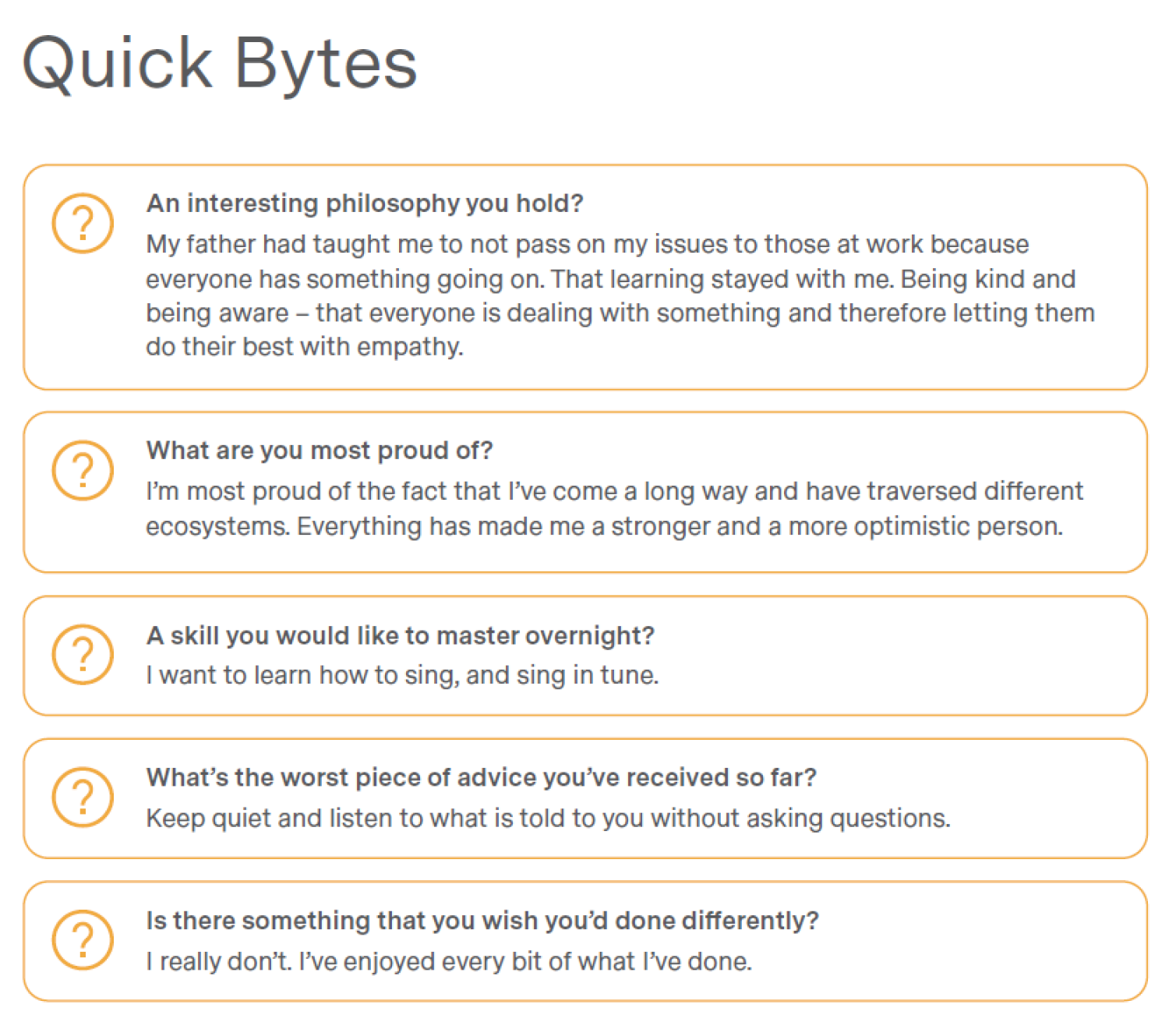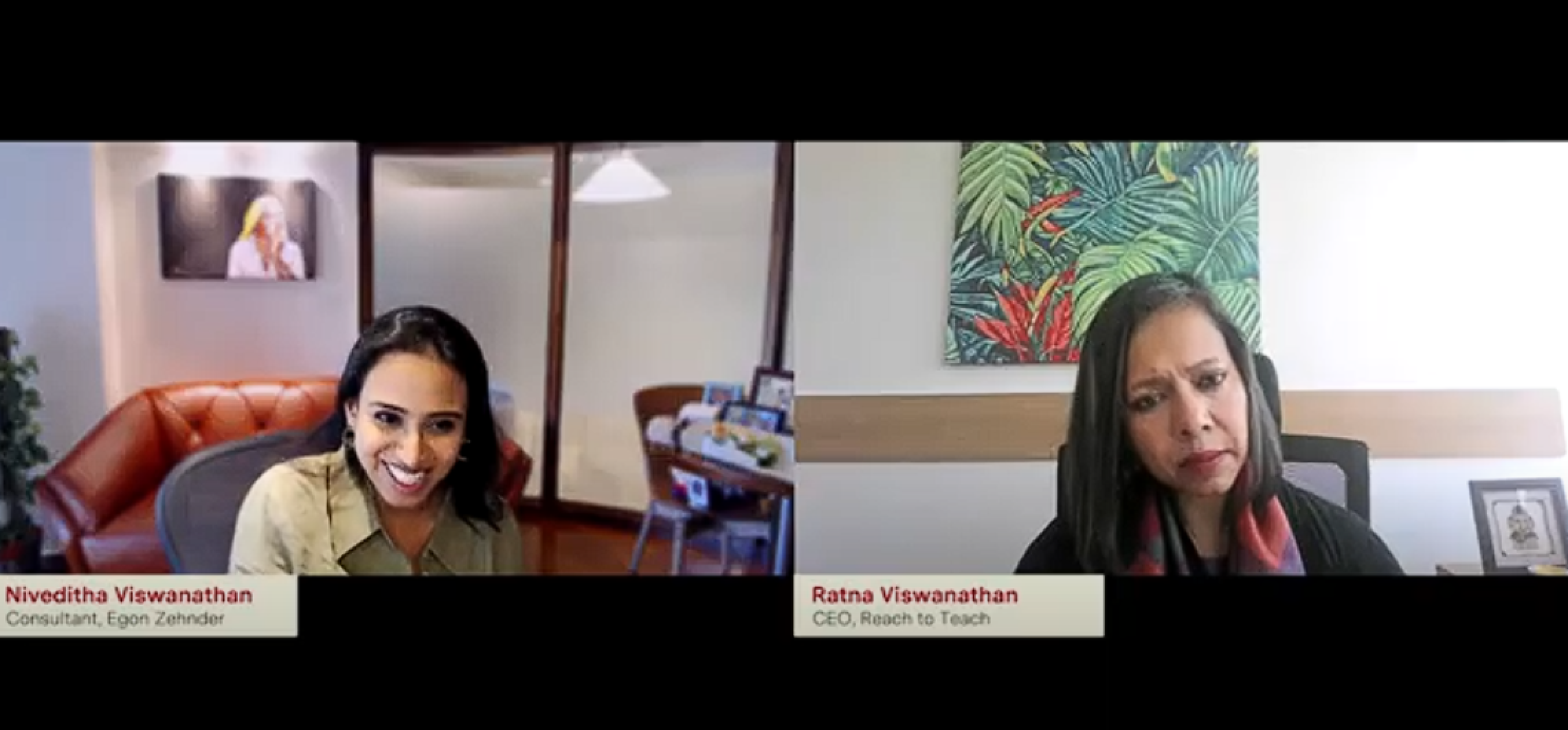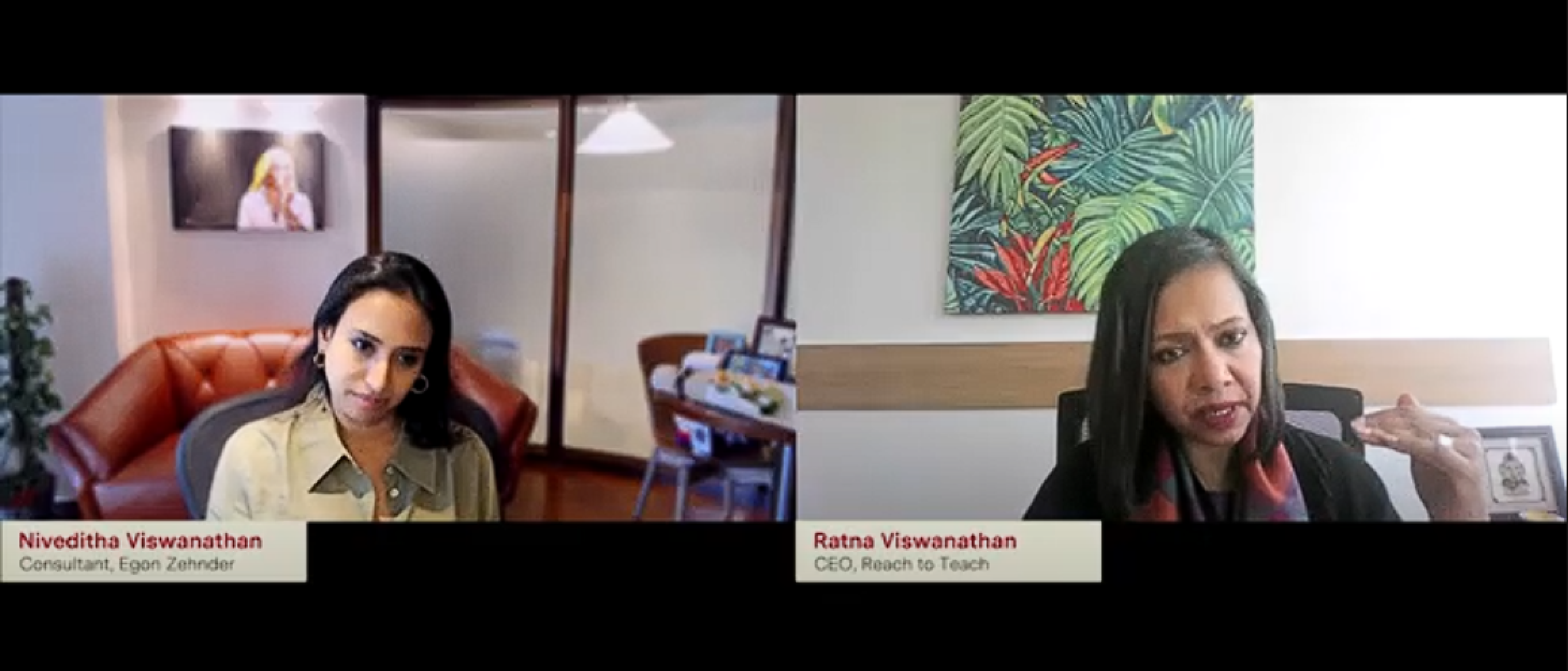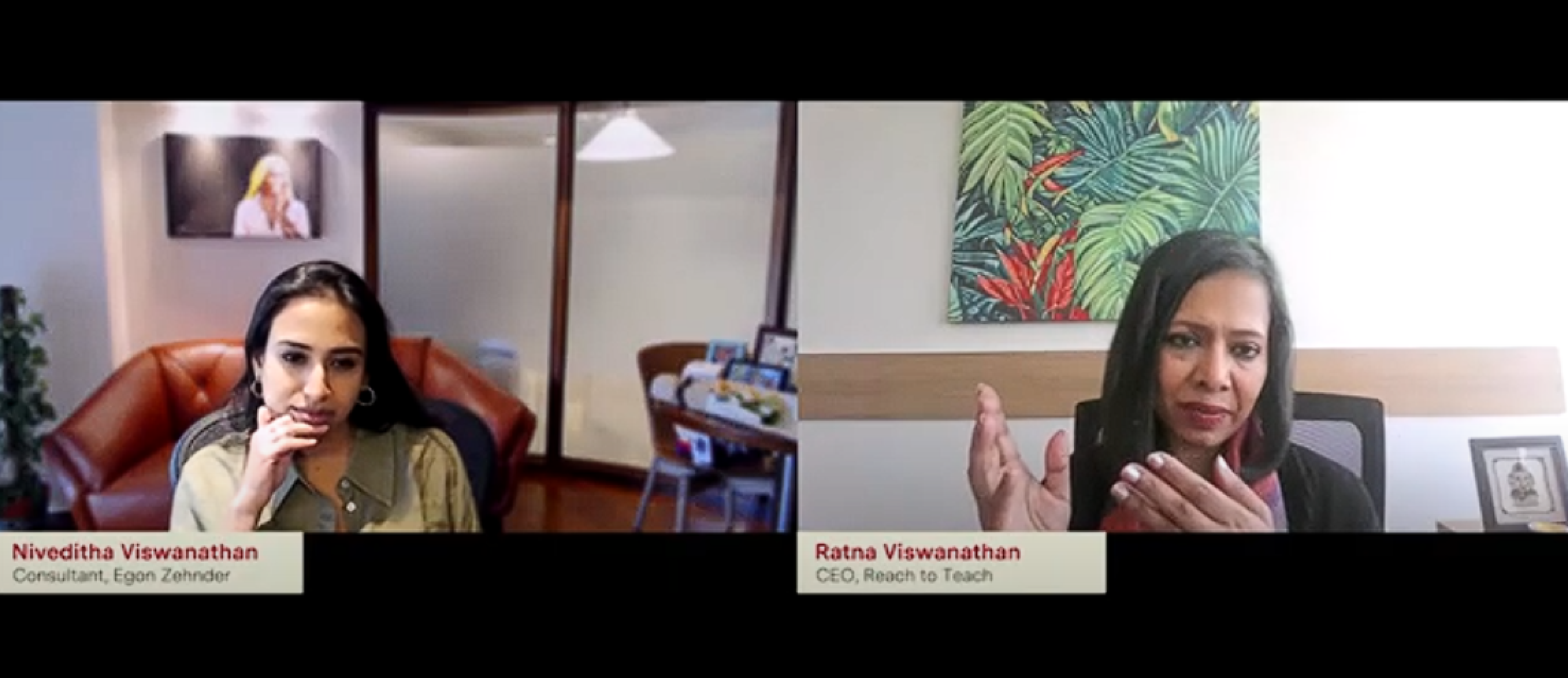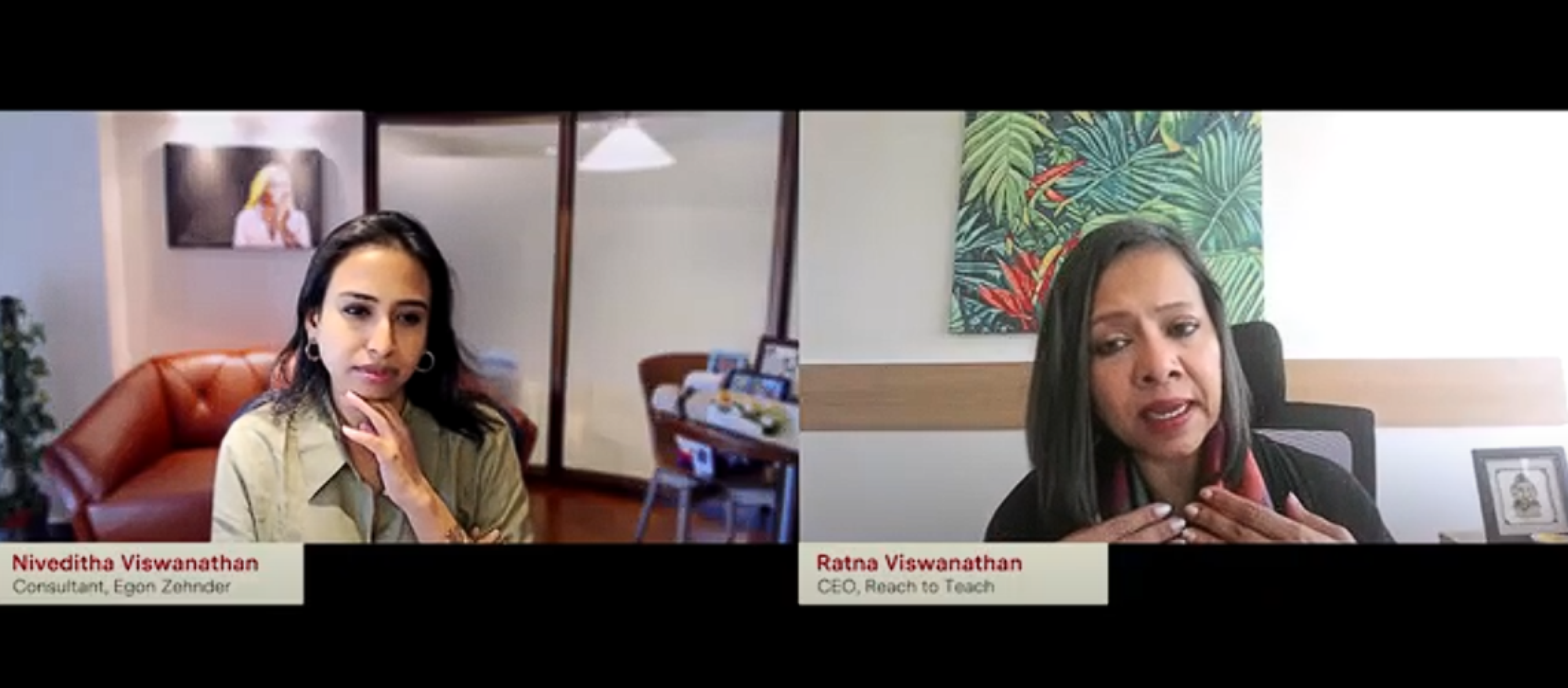Editor's Note: This interview is part of the Blazing a Trail: Women in Leadership series
Ratna Viswanathan is a former civil servant from the 1987 batch of the Indian Audit and Accounts Service. She gave up a highly coveted career in the Civil Services to join the development sector. Prior to joining Reach to Teach, she has held leadership roles at Oxfam India, VSO, MFIN, UNEP and UNDP. She also serves as an Independent Director on Boards of several companies and is currently the Chief Executive Officer of Reach to Teach.
Deeply passionate about making learning a joyful experience for students by fostering teacher agency, Ratna believes in learning out of curiosity and competing with oneself to achieve one’s own potential. She seeks to work from within the existing education system to create an environment that enthuses key stakeholders in a child’s life. Ratna believes learning happens when it is supported by an enabling environment.
What would you like to share about your early life and how it shaped you?
I was born in Cuttack in Odisha in a large family. We are six siblings and grew up with a lot of warmth surrounding us. The worries of adults in our house never permeated into our worlds, which in hindsight was a privilege. My mother was a homemaker, and my father started his career with the Tata Administrative Services and later started his own business. I went off to a boarding school at the age of six, where I found everlasting friendships; and formative experiences of understanding the ‘why’ and ‘how’ rather than chasing the top rank. I learnt that if you ask the right questions and without malice, there is always an answer –this got further reinforced in my later years as a civil servant.
I chose to study English literature from Ravenshaw University in Odisha and then did my post-graduation from Lucknow University with no career plan in sight. And then, quite serendipitously, I took the civil services exam and thus began my career in the Government. That was the beginning, very organic and quite unplanned.
As a young IAS officer, how did you navigate the landscape of hierarchy and protocol as someone who likes to push the boundaries, ask questions, and do things differently?
I spent most of my early career learning, observing and understanding the ecosystem. As a civil servant, I learnt the value of professionalism, earning people’s trust by giving due respect, and importance of long-lasting relationships that stay with you even when you disagree. I realized that I could always make a change by asking questions and having a dialogue. I learned the art of people management. It was all learning on the job, seeing others do theirs and being open to change.
What were your early memories of overcoming challenges, and who were your mentors?
I took a lot of help from colleagues and seniors around me. I joined the Indian Audit and Accounts Service in 1987 after a lot of thought though originally I had qualified for the Indian Police Service. It is a small, well-managed department where one has a ringside view of the Government in its entirety. So there I was with a Master's in English Literature looking at audits of government systems and finances. I soon realized if I broke things down into smaller parts then it was possible to learn and do anything. Everyone around me mentored me in different ways to be able to deal with the work on hand and I reached out without hesitation.
After spending 21 years in the civil services, what prompted the shift to microfinance?
Within the Service, I went on secondment from Audit to the Ministry of Defense and worked on revenue procurement for the Navy, Operations and the Intelligence Desk of the Army and Works Administration desk of Border Roads Organization. After such active roles, I wanted to spread my wings beyond the Audit Department. Serendipitously, an acquaintance reached out for a role in the development sector. Oxfam was Indianizing and looking for a Director of Operations. Soon after, microfinance came to me in a similar way, I was headhunted for the role of Deputy CEO for the Microfinance Institutions Network, the for-profit Microfinance network. I went into the conversation not knowing too much about Microfinance; but realized the organization was looking to set up a framework to create a self-regulating organization after a steer from the RBI where my audit background seemed relevant. I fell in love with the sector because it created financial inclusion for women, helped them create enterprises and gave them voices at home.
What led you to the education sector?
In 2019, I was once again headhunted for a role in Reach to Teach, a UK charity which was moving its operations to India for their India CEO role and despite my initial skepticism at never having worked in the education sector, I met with them. I was quite enthused by their plans and joined the organization just as the lockdown for Covid commenced. I joined a new organization and spent the first two years sitting behind a computer screen in order to reorganize, restructure, re-strategize, hire talent in India and expand operations. All of this happened remotely, but quite organically and did not seem such an uphill task.
Adapting to the kind of roles you’ve done without a formal training and background is not easy. Are there moments of self-doubt?
When you join the Government, the expectation is to hit the ground running. You don’t have the luxury of a learning curve, but you also have a system and process that is well-laid. That early training lets you get into the skin of things as soon as you can. That is the approach I apply to everything I do. You go in and learn a lot on the job; and you ask for help whenever you need it.
Who was your support system as you navigated life and personal situations?
My biggest support system have been my siblings. We are very close. Four of us are in Delhi / Gurgaon, and two are in New York. They are my "2 a.m." friends. We support each other unconditionally.
I also am a practicing Buddhist and my chanting centers me and calms me down. New learnings, new capabilities seem to come my way when I chant. It helped me adapt to new jobs and new life situations.
In the context of your current role in the development sector, what do you wish changed for the sector in India?
We have about 15% children who go to elite private schools who have the best access to everything. A lot of them are likely to go abroad because they’re going through IB and other such systems. For them, play based learning and access to tech comes as part of the package along with high student teacher engagement.
Then there are affordable budget private schools. That has a large spectrum ] - from those that are pretty well managed to those that run out of a hole in the wall. There is a gap in regulation in that segment as we don’t have the bench strength to enforce regulation to this depth.
Thirdly, there are Government schools, which are attended by almost 53% of all Indian students. These schools are managed by the State and the budget, board and other factors are decided by the State.
The gap between the top and bottom is extreme – and while a lot of resources are available at the top, I wish there was a way to bring more attention, intention and access to other segments.
Could you share any initiatives you are currently working on to address these issues?
We need to put the teachers at the center of the ecosystem. Teachers in Government schools don’t get consulted much at all. In Arunachal Pradesh, we did a baseline laddered test across several subjects and did a learning gap assessment. Then we took the existing textbooks and designed activities and experiential-based modules which were incorporated into them, which broke the rote-learning schedule and led to higher student-teacher engagement. The activities were linked directly to learning outcomes as defined by NCERT.
To reach learning outcomes, we also created competency-based worksheets and wrote detailed teacher workbooks that were rolled out to 3,000 schools to ensure that activities were rolled out in a standardized manner across all schools. As a result, the performance has gone up in the 10th grade by 10% and 12% in the 12th grade in Arunachal Pradesh. The latest ASER report shows that their foundational literacy and numeracy percentages are also going up.
So, it is a lot of incremental steps and it takes time, but every drop counts. With some awareness, empathy and emphasis on creating the right infrastructure, we can start shifting the needle – one step at a time.
